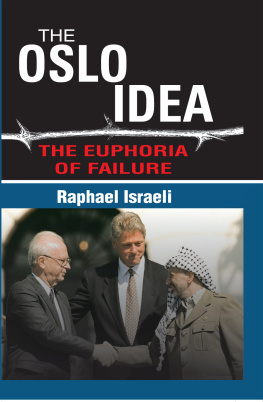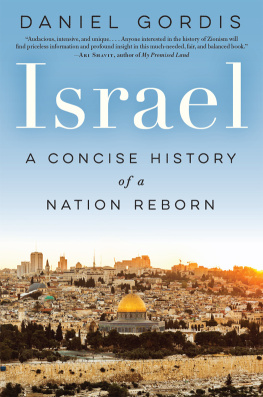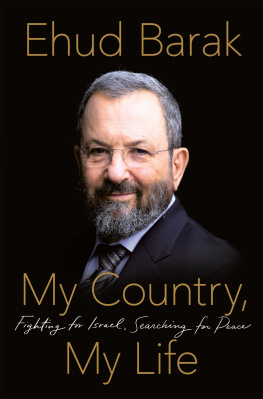Copyright 2008 by Bernard Avishai
All rights reserved. No part of this publication may be reproduced or transmitted in any form or by any means, electronic or mechanical, including photocopy, recording, or any information storage and retrieval system, without permission in writing from the publisher.
For information about permission to reproduce selections from this book, write to Permissions, Houghton Mifflin Harcourt Publishing Company, 215 Park Avenue South, New York, New York 10003.
www.hmhco.com
Parts of this book have appeared, in somewhat different form, in
Harpers, Slate, Barrons, Prospect, and Forward.
The Library of Congress has cataloged the print edition as follows:
Avishai, Bernard.
The Hebrew republic: how secular democracy and global enterprise
will bring Israel peace at last / Bernard Avishai.
p. cm.
Includes bibliographical references and index.
1. National characteristics, Israeli. 2. IsraelSocial conditions21st century. 3. IsraelEconomic conditions21st century. 4. IsraelPolitics and government21st century. 5. Civil societyIsrael. 6. Arab-Israeli conflict1993 I. Title.
DS113.3.A95 2007
956.9405dc22 2007034413
ISBN 978-0-15-101452-1
eISBN 978-0-547-54020-7
v1.1013
For Sidra
Prologue
The Situation
Jerusalems a place where everyone remembers
hes forgotten something
but doesnt remember what it is.
Y EHUDA A MICHAI ,
Songs of Zion the Beautiful
Six years ago, I moved to Jerusalem for the third time, to join my new wife, a professor of literature at the Hebrew University, and to teach at an Israeli business school. This was the winter of 2002 and not the best of times to move to Israel, for the Al-Aqsa Intifada had become a scatter of suicide bombings, and Ariel Sharons government was preparing the first of its fierce responses in Operation Defensive Shield. When I met one old friend, she put her hand to the back of my head and started feeling around through my hair. Im looking for the hole, she said. I had spent the best part of the 1970s living in Israel, and the better part of the 1980s visiting and writing about the country, so the new disturbances, and little ironic gestures of solidarity, were not unfamiliar. But something had changed, certainly among my graying friends, a sadder but wiser air, a sense of being unluckya barely suppressed hunger to speak in big categories about formative years.
There have been dramatic turns since then, which raised spirits for a time, the way shock treatments are said to cure for a time: the fall of Saddam, the Saudi peace plan, Arafats succession by Fatahs Mahmoud Abbas, Sharons blitz evacuation of Gaza, the launching of the centrist Kadima party. Hamas then won a majority in the Palestinian parliament, refusing recognition of Israel, and Israelis elected a government sworn to unilaterally erecting permanent borderseach vote a relapse into the logic of vendetta.
Then there was war again in Southern Lebanon, which took nearly all Israelis by surprise, though in a way that seemed to vindicate the working hypothesis. My wife noticed that even educated Israelis had begun to refer to the matzav, the situation, no longer to the conflict. And that is still the case. As I write, the Israeli Defense Force (IDF) exchanges periodic fire with Hamas-controlled Gaza, Tony Blair has assumed the post of Middle East envoy, and Secretary of State Condoleezza Rice has convened a peace summit in Annapolis for later in the fall. If, by the time these words are published, peace talks are not in the headlines, then the consequences of their failure will be. But you listen to the talk shows, or have dinner with a colleague, and there is little about possible diplomatic openings. The conversation is rather about managing a chronic condition, like cancer, or earthquakes.
Not that Israelis are stoic about people they think are insufficiently worried about them. During the Lebanon fighting, in July of 2006, I got in touch with an old friend who has lived in and around Tel Aviv since the 1970s. His parents big Hungarian family had been decimated by the Holocaust; I have known (and dearly loved) him since we were children in Montral. I happened to be out of Israel at the time of the war, and I had called to express my concern. But I also wanted to share misgivings about the Israeli Air Force bombing Lebanese ports, oil refineries, and southern towns in response to Hezbollah provocationsnot just instinctive misgivings about the deaths of so many Lebanese civilians (among them, children), but the fear that, by bombing in this way, Israel could only alienate the Beirut middle classes and inadvertently strengthen the prestige of insurgent groups it could not destroy. And how long before scenes of bloody rubble, broadcast on Al Jazeera, would prompt demonstrations in Cairo that the Mubarak regime would be unable to contain?
But by the time I reached my friend that summer, Hezbollah missiles were falling by the hundreds on Northern Israeli towns, and our conversation grew fraught. I had missed, he told me, the robust consensus that had spontaneously developed in the country. He e-mailed the next day:
I believe that you are profoundly out of touch with the realities of dealing with our neighbors; that you mirror the ideas which have made the left increasingly irrelevant to the great Israeli debate of how to disengage from the settlements and the Palestinians, on the way to rescuing Israel as a Jewish and democratic state, and finding some workable formula first for co-existence, and later for peace. The brutal and reactionary nature of the regimes and ruling lites involved, and the imperialistic interventionism of regional powers (now its Irans turn), continue as in the past to sabotage the effort to move us in a constructive direction. The new factor, which did not exist before, is an Islamic, jihadist imperialism with global aspirations and the mega-trillions of oil revenues to back it. Im well aware of its non-homogeneous nature, internal contradictions and weaknesses. And I contend that to belittle or underestimate it is suicidal folly...
Im writing to confirm what my red line is, even though you know it very well. Its the commitment to the two-state framework. Its because I know how deeply you care about Israel, and about the Jewish people, that I can handle anything you say, no matter how much I may disagree. What I cant do is accommodate people like Meron Benvenisti, whom I respect, or Tony Judt (less so), who have concluded that the Jewish state is a lost cause. I dont need to question their good intentions or integrity, and I dont. But being under attack for merely existing is radicalizing, which makes middle grounds and moderate positions increasingly untenable... [No peace plan] has a chance if we dont demonstrate once again that we have the will to exercise the force necessary to defeat attempts to undo 1948...
What Im wondering is where your red line runs. We have been like brothers for the vast majority of our lives, over 50 years. I wont repeat my earlier comments about the polarizing effects of such conflicts. I want to believe, as I always have, that nothing could ever come between us, no matter how much we might disagree about anything. But this is too deep, too central to my entire life and being, too critical for my system of meaning, for it not to be a threat. Its not an intellectual difference. Its absolutely about who we are, in our deepest essence.
There are many claims in my friends letter that might seem true to the situation: that navet about Arab intentions has marginalized the old Israeli peace movement; that a measure of this navet is the refusal to recognize how national power derives from military power (or the credible threat of military power), and that Jews have no excuse for believing otherwise; that older Arab regimes are more or less reactionary and positioning themselves for regional hegemony; that they pander to Islamist fundamentalists, who have Israels destruction (but not only Israels) in their sights; that Israelis, in contrast, have always stood ready to offer reasonable terms for peace, while the regime in Iran, bound to acquire nuclear weapons, would have no compunctions about exterminating Israel; that last summers war was the moment to draw red lines.
Next page







